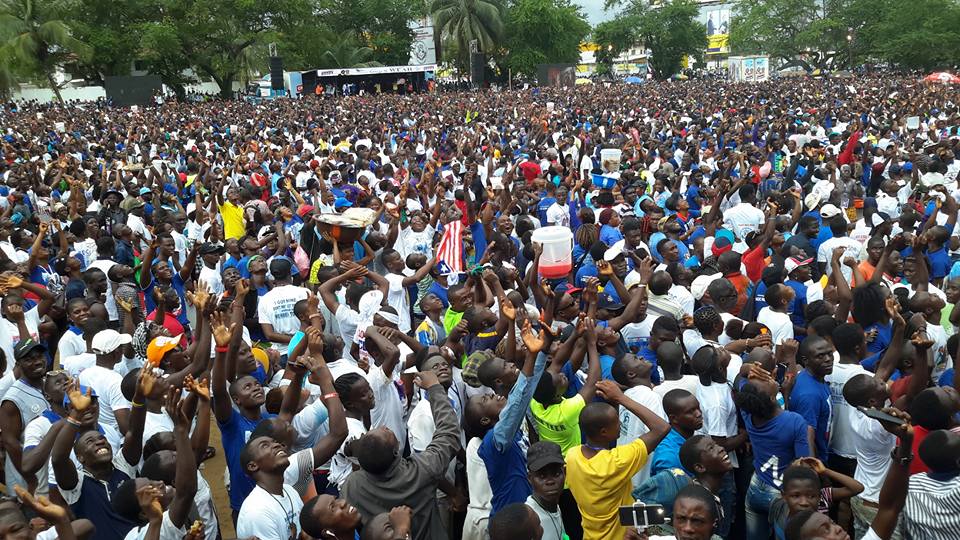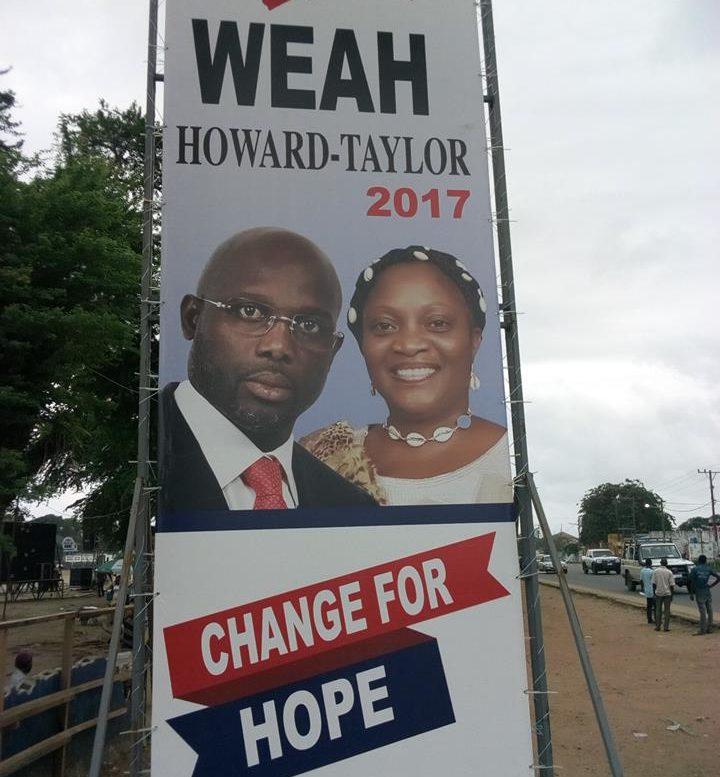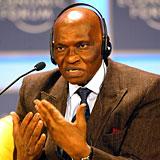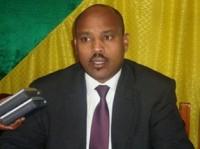Could a former winner of the Ballon d’Or become Liberia’s next president?

George Weah was the presidential runner-up in 2005. Ahead of the October vote, he is drawing huge crowds again and hopes to do one better.

George Weah supporters await his arrival at the party headquarters in Congo Town, Monrovia. Credit: Stephen D. Kollie.
On Saturday, 19 August, ardent supporters of Liberia’s presidential candidate George Weah brought the capital to a standstill. Over the course of 14 hours, the opposition senator, accompanied by Ivorian musician Meiway, paraded through the streets Monvoria as thousands thronged to hear him speak.
Even under the falling rain, devotees continued to dance and chant slogans into the night. Eventually, a few minutes to midnight, the 50-year-old former footballer arrived at his party headquarters in Congo Town to address excited supporters.
“Fellow partisans, throughout the history of our struggle and my political journey, I have been besieged by criticisms and overwhelmed with the question as to why I am seeking the presidency…No amount of negativity will distract me from fighting for change and a prosperous Liberia,” he said to thunderous applause.
With Liberia set to go to the polls on 10 October, political campaigning is now in full swing. The incumbent, Ellen Johnson Sirleaf, is required to step down after two terms in office, which means the country is about to get a new president.
The candidate who would provide the most continuity is Sirleaf’s 72-year-old vice-president, Joseph Boakai. But many Liberians are looking for change. As the leader of the largest opposition party, the Coalition for Democratic Change (CDC), those who attended Weah’s rally see him as the figure most likely to provide it.
“From what I see today there is no way Weah will lose this election,” said Esther Pailey, a petty trader. “Boakai is too old to lead us. Besides, there is no way you can separate Boakai from Ellen.”
“In 2005, Ellen Johnson Sirleaf and her VP cheated us,” said James Sammy, a CDC supporter, referring to Weah’s 2005 presidential bid in which he lost in the run-off. “We accepted the result because we just came from war. But this is our time to win the election.”
[Runners and riders: Liberia gears up for most unpredictable elections yet]
Heading for the top job
Weah first became known in Liberia and around the world in the 1990s for being one of the best footballers of his generation. He played for the likes of Monaco, Paris Saint-Germain and AC Milan, and was the first African player to win the prestigious FIFA World Player award and Ballon d’Or.
In 2003, the same year that Liberia’s brutal civil war ended, Weah retired from football. In 2005, as the country held its first post-war elections, he put his name forwards to contest for the presidency.
Off the back of his popularity as a footballer and despite accusations of his lack of experience, Weah won the first round with 28%. In the run-off against Sirleaf, he lost comprehensively to the former World Bank official with 41%.
Weah stayed in politics, however. In 2011, he stood as the running-mate of Winston Tubman, again losing in the run-off. And in 2014, Weah became a Senator for Monteserrado County after defeating President’s Sirleaf’s son Robert at the ballot box.
Now, as Liberia gears up for this third combined post-war elections, Weah is vying for the top position once more. In a crowded race of 20 candidates, he hopes that his popularity with young people and his extra support gained by joining forces with running-mate Jewel Howard-Taylor, the ex-wife of imprisoned former leader Charles Taylor, could take him closer than ever.
“Weah’s popularity cannot be overlooked,” says political analyst Samuel P. Freeman. “He’s the most popular opposition candidate as we have seen in all the elections he’s participated. If the people we saw at that rally really translate into votes, then Weah stands a better chance than any candidate.”
He faces a strong opponent in Vice-President Boakai, however, who held a huge political rally in Monteserrado County this weekend along with his running mate and speaker of the House of Representatives, Emmanuel Nuquay. The size of the crowds has made some question whether the populous county can still be counted on as a CDC stronghold.
Tackling Liberia’s challenges
In his campaigns, Weah has promised to transform Liberia if elected. Like his fellow competitors for the presidency, he has made the struggling economy one of his main talking points. Liberia is in recession and the government’s tax increases earlier this year led to mass protests.
Weah vows to turn this around and make Liberia a middle income country. “My presidency will focus on building an economy that will focus more on empowering the lives of the masses and improving their livelihoods,” he announced. “I want to see a Liberia where our market women and petty traders too will own cars and be able to drive to their various areas of business.”
In his campaigning, the opposition figurehead has also honed in on corruption, an issue that has dogged President Sirleaf’s time in office.
“There will be no recycling of corrupt officials in my government,” said Weah. “If you are found culpable of corruption, you will no longer work in my government. This is a promise to the Liberian people.”

A like for like substitution?
Following 12 years of President Sirleaf, the 10 October elections provide an opportunity for change and a break from the Unity Party’s rule. But it remains difficult to predict which way people will vote. Sirleaf and VP Boakai have a mixed record in office, while a host of new political entrants has further complicated the race.
Some commentators, however, argue that focusing on the presidency misunderstands the nature and depth of Liberia’s challenges.
“No one builds a house beginning with the rooftop,” says Torli Krua, president of Universal Human Rights International. “Liberians focussing on presidential candidates instead of the flawed, corrupt and broken constitution are building their houses without a plan…We have a corrupt system and people are going crazy over a bunch of ignorant 20 aspirants interested only in getting rich at the expense of the people.”
Krua claims that Sirleaf centralised power in herself, and suggests that Weah’s approach would be similar. “Weah’s first and second presidential campaigns were all about putting Weah at the help of power within a corrupt, deadly and broken system. Weah had no plans of changing Liberia’s corrupt system of governance,” he says.
This suggests that a change of power at the top may do little to instigate real change. However, the symbolic act of a transition of power may be transformative in of itself for a country whose brutal civil war ended just 14 years ago.
Many today believe that Weah is best-placed to provide this shift. Freeman suggests that if no candidate gains a majority in the first round and there is a run-off, the opposition parties may well coalesce behind Weah. If this happens, he says, “that’s the end of the Unity Party”.







comrades we have enough cocaine drug addict leaders in West Africa. If George Weah is cocaine drug addict he is rumored to be he is not a person who will perform in capacity needed in Liberia thus, in best interest of people of Liberia should not be president. Liberians have had what is rumored to be twelve years of cocaine drug addict Ellen Sirleaf incompetent plus corrupt nepotic leadership. It do not need more of wrong stuff. Liberians are able to do better plus should. Very much sincere, Henry Price Jr. aka Obediah Buntu IL-Khan aka Kankan aka Gue.
I believe this young man, George Weah can perform political and economic magic if voted into power. The power that be in Africa vehemently opposed his ascent to the much exalted presidential throne then. The time is ripe for him to reclaim his stolen victory years back. I wish him the best in the forthcoming election. Try fresh blood like in Canada and France not the old tired minds again.
Wake-up everybody! With signature ritualistic killings, endemic corruption, excessive salaries and benefits of government officials, Liberia’s system of governance is rotten to the core and broken by design. Nothing will change until the citizens prioritize changing the broken system. And who is qualified to bring such a change? Educated or illiterate, the citizens are more qualified than politicians to bring systemic change because democracy is a government of the people, by the people and for the people! The Holy Bible supports systemic change. Matthew 12:33 “Either make the tree good, and its fruit good; or make the tree corrupt, and its fruit corrupt: for the tree is known by its fruit”. We have to start somewhere. So we begin with the Liberian saying; “99 days for rogue, one day for master.” http://www.mastersday.com
Yes, the master must first create a blueprint before hiring qualified contractors to work on the terms of the master to successfully construct a home that lasts. The master, not the contractor must set the salaries and benefits. For 170 years Liberia has been in deep trouble because we have relied on politicians (contractors) to set their own salaries and benefits and determine our destiny with their agenda and their platforms. How foolish? The contractor’s design of 1847 was flawed and their revised design of 1986 is corrupt, broken and designed to enrich politicians. As long as the broken system remains, anyone jumping in the sea of corruption will only get rich and leave the country broken. We just witnessed 12 years of the broken system at work! Proof: All Liberian lawmakers earn higher salaries than lawmakers in all 50 states in America. The highest paid American state lawmaker from California, a state with US$265 billion dollars budget is US$104,118.00 yearly salary. Compare that the salary of senators of over US$156,000.00 yearly. As long as Liberia’s broken system of governance is firmly in place, the noise from the chorus of 20 presidential aspirants amount to empty promises that cannot be fulfilled. They are fooling themselves and the public. The people’s platform and agenda created by ordinary citizens are by far superior and better than the agenda of any politician. Proof: Look at what the so called “uneducated” citizens have accomplished in Liberia: they pay majority of tuition and school fees for Liberian students, operate countless mechanic shops, provide transportation for the country, make farms that feed the people. Compare that to what the politicians have accomplished: They set excessive salaries and benefits, build mansions at home and abroad. After 170 years, how long will we continue allow politicians to hijack democracy? Drinking from a broken glass isn’t only dangerous-it didn’t work back then and and hasn’t worked for the past 170 years. It’s time to start from scratch and design a new system before hiring contractors to build. 30 years from now, Liberia will be 200 years old. What will we have to show for two centuries of existence if we allow the politicians who designed the corrupt system to determine our future? How about letting them have the 170 years and giving Liberia a fresh start for a new future designed by citizens, not the greedy politicians? There is one reason why: “99 days fr rogue, one day for master.” http://www.mastersday.com Make October 10, 2017 the day of the master!
He should not.
When the black world starts being objective about their destiny and future, will we get out of the woods.
The question therefore would be, what experience does the footballer brings to bare and on what basis does Liberians tend to put their destiny, in the hands of one that paraded nothing to justify occupation of the highest office in Liberia?, besides
It is high time we begin to see beyond sentimental applications, to serious national issues that borders on good standing, of our commonwealth in committee of nations.
The black man must allow brain to reign supreme at all times, neither emotions nor brawls.
Liberia!!, your destiny beckons one more time, take it in your own hands.